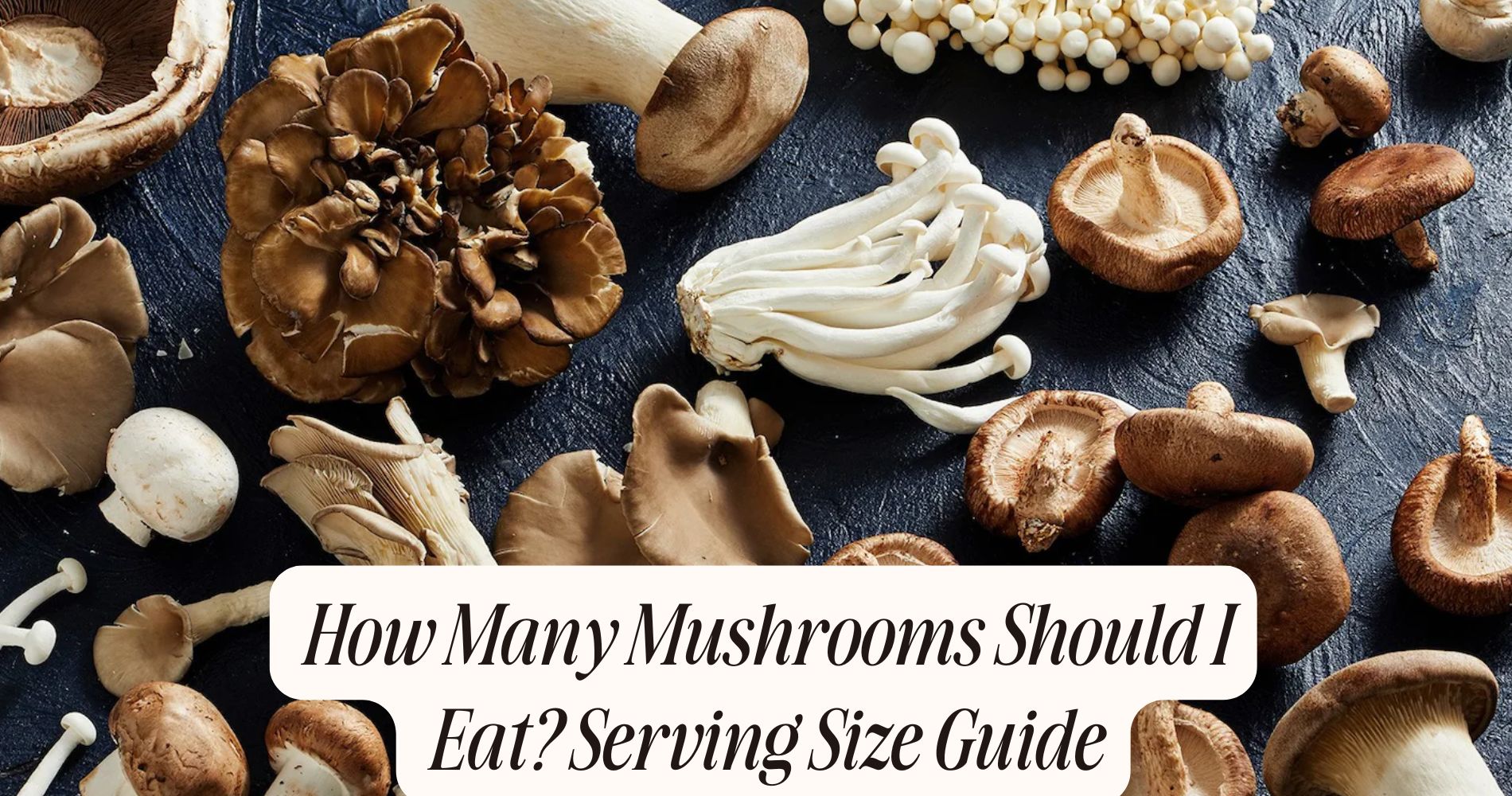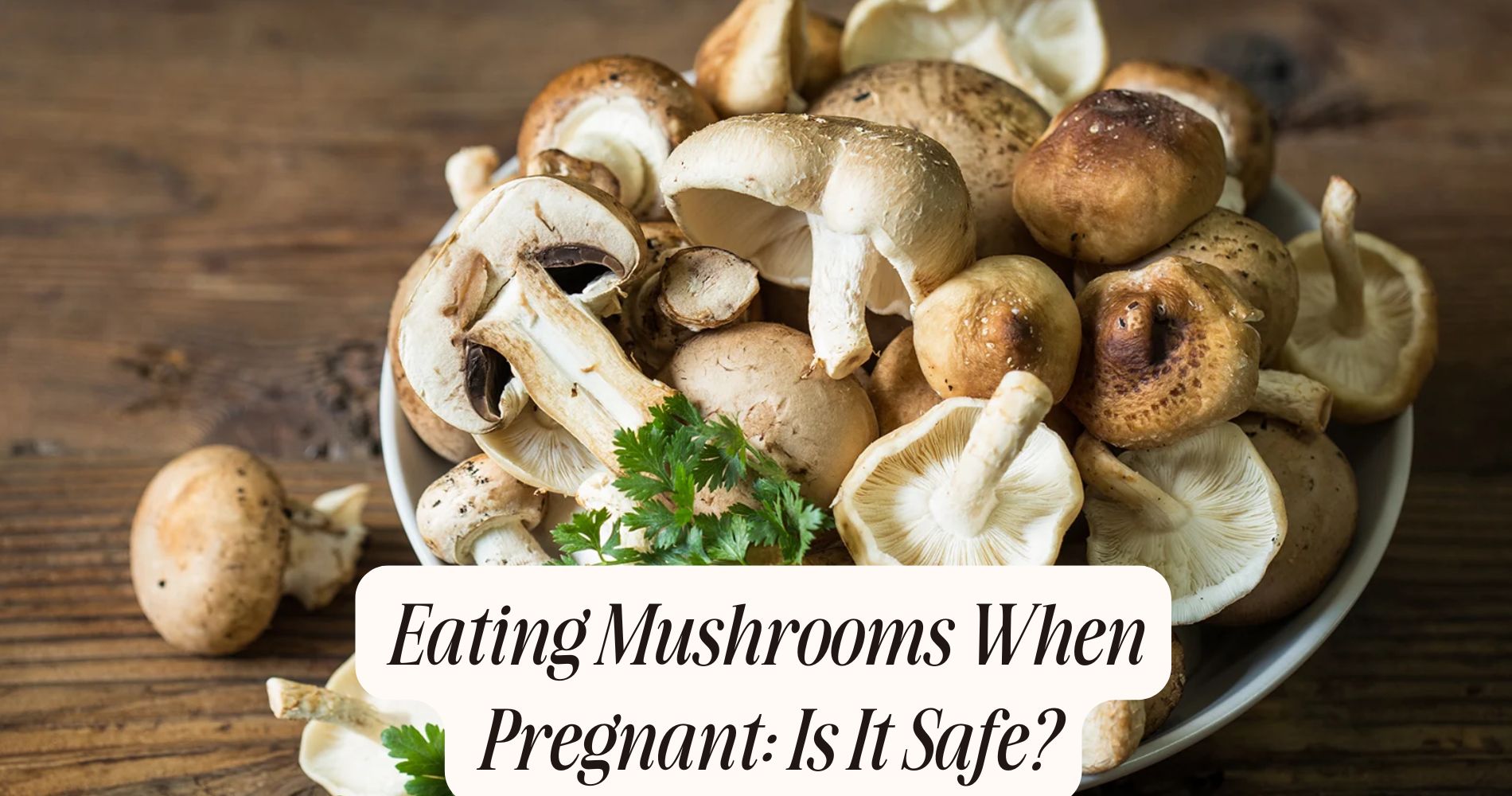
How Many Mushrooms Should I Eat? Serving Size Guide
How much mushrooms should i eat? Mushrooms are a nutritious part of your diet, with recommended serving sizes varying by type. Generally, aim for one cup of raw mushrooms, about 75 grams for shiitake or around 120 grams for a large portobello cap. These portions guarantee you get essential nutrients without overdoing it. When cooking, remember that mushrooms shrink, so adjust your portions accordingly. To learn more about incorporating mushrooms into your meals and their benefits, keep exploring!
Understanding Different Types of Mushrooms
When exploring the world of mushrooms, it’s essential to recognize that not all types offer the same nutritional benefits or culinary uses. Many edible varieties, such as shiitake, cremini, and portobello, provide important vitamins, minerals, and antioxidants.
Understanding mushroom identification is key to guarantee safety and enjoyment. Some mushrooms, like morels and chanterelles, are prized for their unique flavors, while others, like the poisonous Amanita, can be deadly.
Familiarizing yourself with the characteristics of different types can help you make informed choices. Always consult reliable resources or experts when foraging or purchasing mushrooms.

Recommended Serving Sizes for Common Mushrooms
Although the ideal serving size of mushrooms can vary depending on the type and your dietary needs, a general guideline suggests consuming about one cup of raw mushrooms per serving.
For common varieties, a portobello serving typically weighs around 120 grams, which is roughly one large cap. This size provides a satisfying addition to your meals.
When it comes to shiitake mushrooms, a recommended portion is about 75 grams, or roughly one cup when sliced. This quantity can enhance your dishes with their distinct flavor while keeping calorie counts manageable.
Remember that cooking methods can also impact serving sizes, as mushrooms tend to shrink when cooked, so adjust your portions accordingly to maintain your desired intake.
Nutritional Benefits of Mushrooms
Mushrooms are a powerhouse of nutrition, offering a range of health benefits that can enhance your diet.
They're low in calories yet high in essential nutrients, including B vitamins, selenium, and antioxidants. These compounds help support your immune system, reduce inflammation, and promote heart health.
Additionally, mushrooms are a great source of dietary fiber, which aids digestion and helps maintain a healthy weight.
Their unique umami flavor makes them versatile in culinary uses, allowing you to incorporate them into various dishes, from soups to stir-fries.
With their rich nutrient profile and delicious taste, adding mushrooms to your meals not only boosts nutritional value but also elevates overall enjoyment of your food.

Tips for Incorporating Mushrooms Into Your Diet
To easily incorporate mushrooms into your diet, consider adding them to dishes you already enjoy. You can toss sliced mushrooms into your favorite stir-fries or sauté them with garlic and olive oil as a side dish.
Explore various mushroom recipes, such as creamy mushroom risotto or hearty mushroom soups, that showcase their flavor and texture. Experiment with different cooking techniques like grilling, roasting, or even blending mushrooms into sauces for added depth.
Don’t forget to try mushrooms in salads, omelets, or as a pizza topping for a nutritional boost. By integrating mushrooms into familiar meals, you'll enhance both taste and health benefits, making it simple to enjoy their unique culinary versatility.
Potential Risks and Considerations When Eating Mushrooms
While incorporating mushrooms into your diet can offer numerous health benefits, it’s important to be aware of potential risks and considerations.
First, some individuals may experience allergic reactions to certain mushroom species, leading to symptoms like itching, hives, or gastrointestinal issues. It's essential to monitor your body's response when trying new varieties.

Additionally, be cautious of toxic varieties, such as the infamous death cap mushroom, which can be deadly if ingested. Always source mushrooms from reputable suppliers or markets.
If you're foraging, verify you have proper identification skills to avoid dangerous species. Consulting with a healthcare provider can also help you understand any personal health risks associated with mushroom consumption.
Stay informed to enjoy mushrooms safely!
Elevate Your Health with SUPER MUSHROOM GUMMIES
Looking for an easy and delicious way to enjoy the benefits of mushrooms? Well Gummies’ SUPER MUSHROOM GUMMIES are the perfect solution! With 10 functional mushrooms packed into each vegan gummy, these gummies naturally fuel your brain, enhance focus, and support immune health. Enjoy the fresh wild berry flavor, just like your favorite candy—without the jitters or crash. Energize your body and stay sharp all day with SUPER MUSHROOM GUMMIES, a convenient and tasty way to boost your wellness!
Frequently Asked Questions
Can I Eat Mushrooms Raw or Should They Be Cooked?
You can eat mushrooms raw, enjoying benefits like higher nutrient retention, but cooking them enhances flavor and digestibility. Different cooking methods, such as sautéing or grilling, can elevate their taste and texture considerably.
Are There Any Specific Mushrooms to Avoid Completely?
You should avoid wild mushrooms unless you’re certain they're safe. Many toxic varieties, like the death cap or fly agaric, can cause severe health issues. Always consult an expert before foraging or consuming unfamiliar mushrooms.
How Do I Store Fresh Mushrooms Properly?
To store fresh mushrooms properly, use ideal mushroom containers like paper bags or perforated plastic. These mushroom storage techniques help maintain moisture while preventing spoilage, ensuring your mushrooms stay fresh and flavorful for longer periods.
Can I Freeze Mushrooms for Later Use?
Yes, you can freeze mushrooms for later use. For effective mushroom preservation, use proper freezing techniques like blanching first, then cool and freeze them in airtight containers to maintain texture and flavor.
Do Mushrooms Interact With Any Medications?
Mushroom interactions can affect medication effects, particularly with anticoagulants and immunosuppressants. If you're on medication, consult your healthcare provider before adding mushrooms to your diet to avoid potential adverse reactions and guarantee safety.
Conclusion
Incorporating mushrooms into your diet can offer numerous health benefits, but it’s crucial to understand proper serving sizes and types. Generally, aim for about 1 to 2 cups of cooked mushrooms per week, depending on your dietary needs and preferences. Remember to include a variety of types to maximize nutritional benefits. While mushrooms are safe for most, be mindful of potential allergies and avoid consuming wild varieties unless you're certain of their safety. Enjoy exploring different ways to add them to your meals!




